Taxation Law Assignment: Analysis of Mustafa's Tax Situation - 2019
VerifiedAdded on 2022/08/26
|8
|1696
|21
Homework Assignment
AI Summary
This taxation law assignment analyzes the tax implications for two clients, Mustafa and Donna, based on their financial activities. The assignment explores various aspects of income tax, including salary, bonuses, tips, interest, rent, profits from shares, dividends, inheritance, and gambling winnings. It also examines the application of capital gains tax on share sales and property sales, as well as payments received for restricting business activities. Furthermore, the assignment delves into the Australian residency tests, including the resides test, domicile test, 183-day test, and superannuation test, to determine the residency status of an individual named Diebe. The solution provides detailed explanations, references relevant case laws, and legislation to support the analysis.
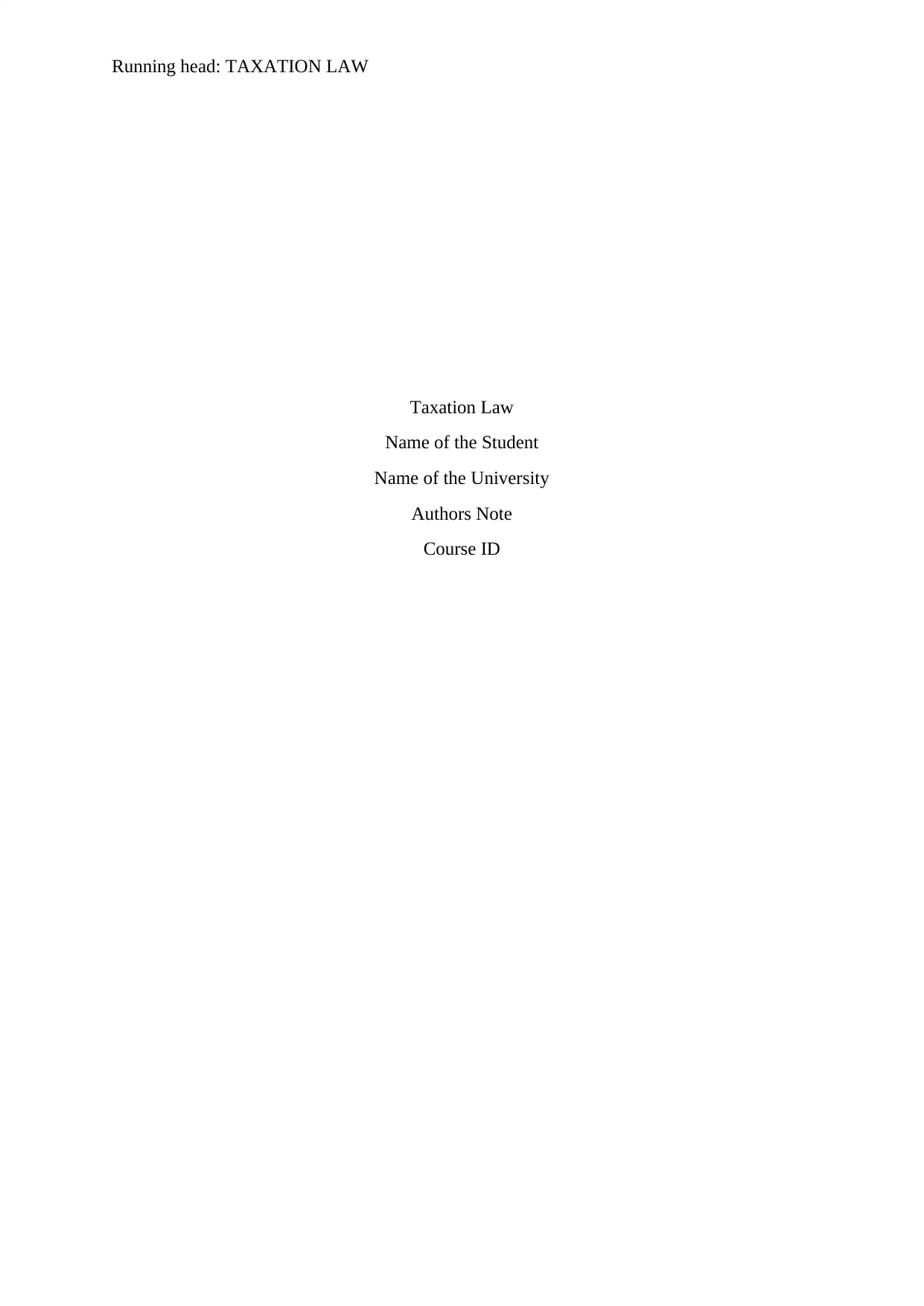
Running head: TAXATION LAW
Taxation Law
Name of the Student
Name of the University
Authors Note
Course ID
Taxation Law
Name of the Student
Name of the University
Authors Note
Course ID
Paraphrase This Document
Need a fresh take? Get an instant paraphrase of this document with our AI Paraphraser
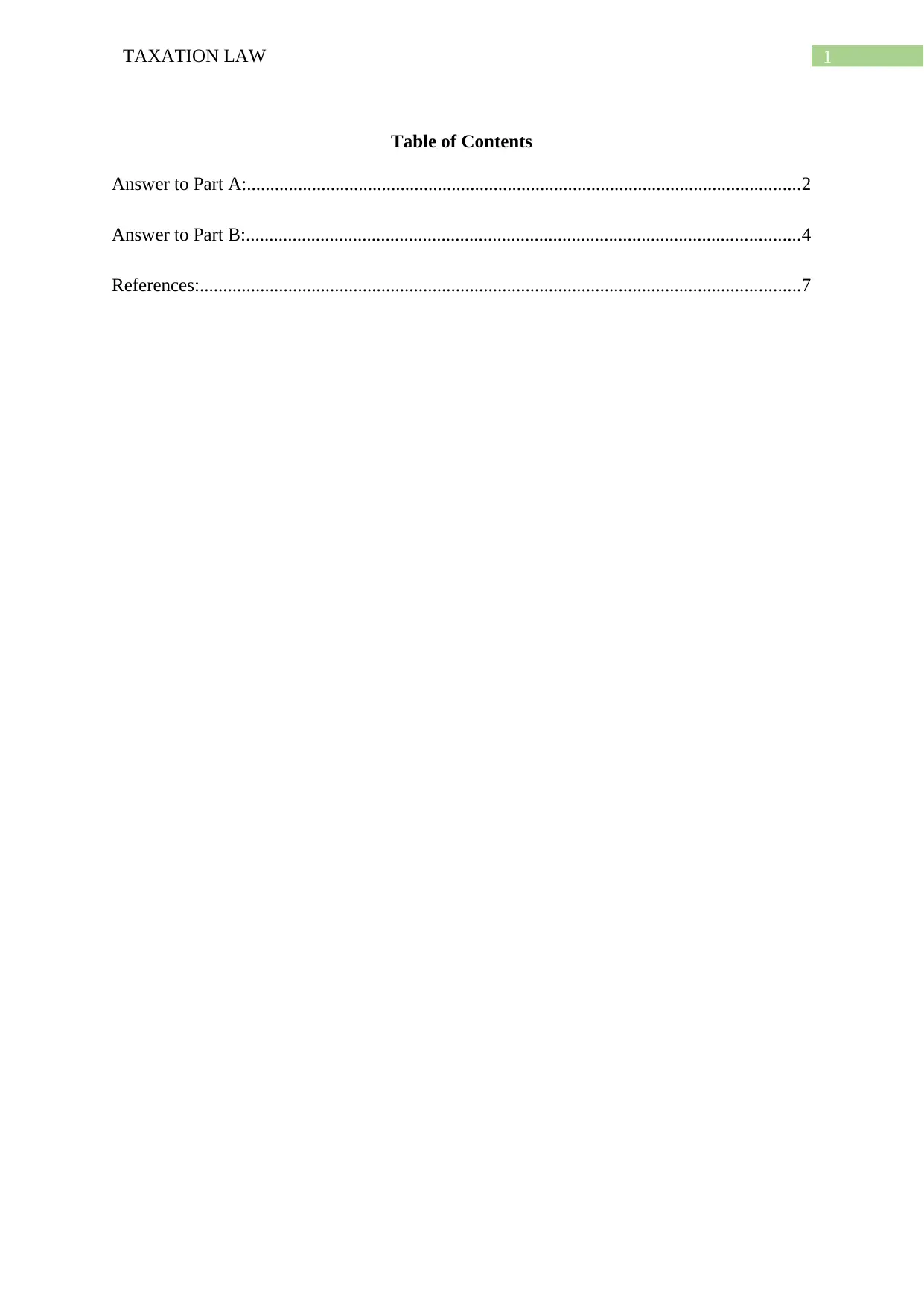
1TAXATION LAW
Table of Contents
Answer to Part A:.......................................................................................................................2
Answer to Part B:.......................................................................................................................4
References:.................................................................................................................................7
Table of Contents
Answer to Part A:.......................................................................................................................2
Answer to Part B:.......................................................................................................................4
References:.................................................................................................................................7
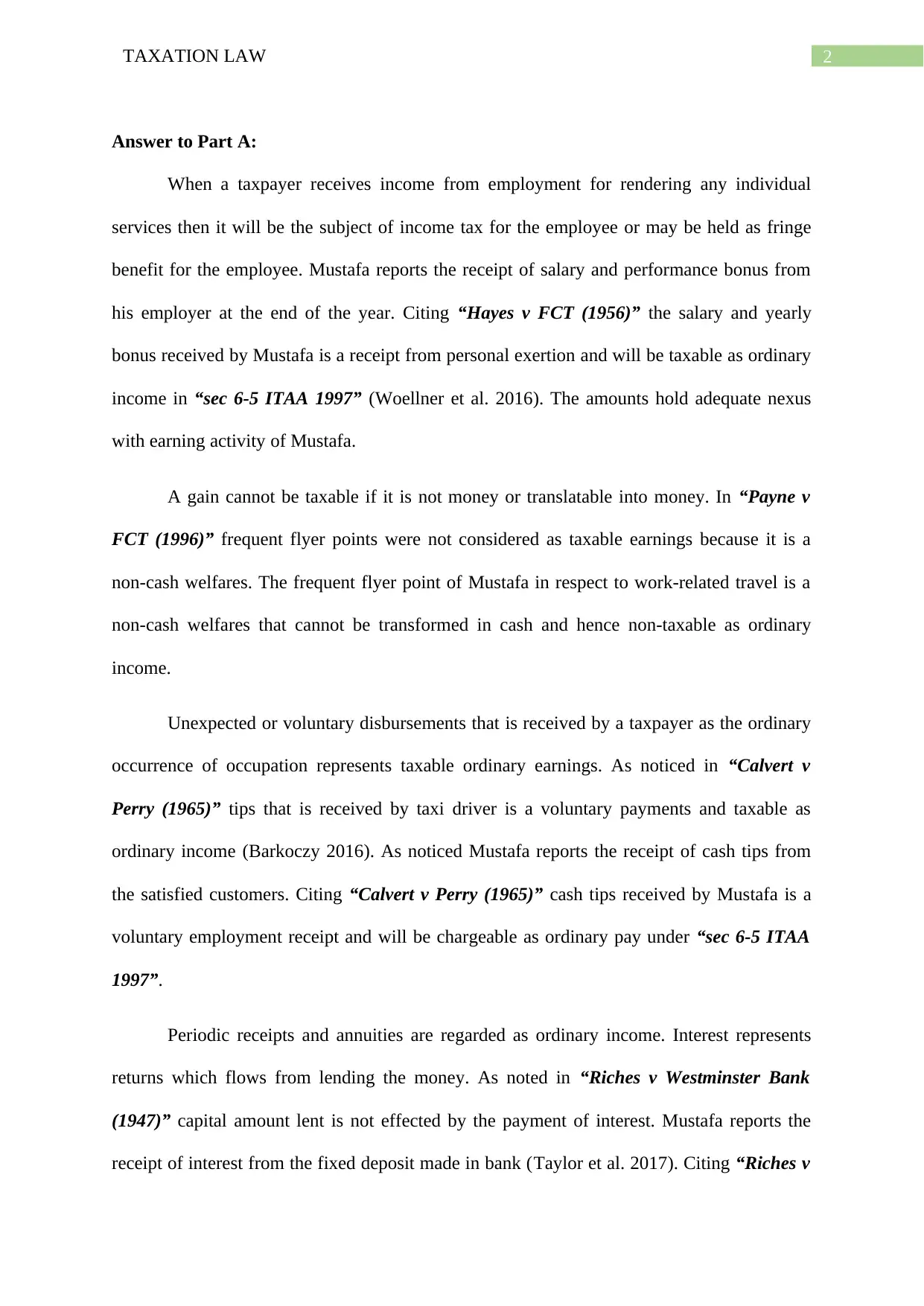
2TAXATION LAW
Answer to Part A:
When a taxpayer receives income from employment for rendering any individual
services then it will be the subject of income tax for the employee or may be held as fringe
benefit for the employee. Mustafa reports the receipt of salary and performance bonus from
his employer at the end of the year. Citing “Hayes v FCT (1956)” the salary and yearly
bonus received by Mustafa is a receipt from personal exertion and will be taxable as ordinary
income in “sec 6-5 ITAA 1997” (Woellner et al. 2016). The amounts hold adequate nexus
with earning activity of Mustafa.
A gain cannot be taxable if it is not money or translatable into money. In “Payne v
FCT (1996)” frequent flyer points were not considered as taxable earnings because it is a
non-cash welfares. The frequent flyer point of Mustafa in respect to work-related travel is a
non-cash welfares that cannot be transformed in cash and hence non-taxable as ordinary
income.
Unexpected or voluntary disbursements that is received by a taxpayer as the ordinary
occurrence of occupation represents taxable ordinary earnings. As noticed in “Calvert v
Perry (1965)” tips that is received by taxi driver is a voluntary payments and taxable as
ordinary income (Barkoczy 2016). As noticed Mustafa reports the receipt of cash tips from
the satisfied customers. Citing “Calvert v Perry (1965)” cash tips received by Mustafa is a
voluntary employment receipt and will be chargeable as ordinary pay under “sec 6-5 ITAA
1997”.
Periodic receipts and annuities are regarded as ordinary income. Interest represents
returns which flows from lending the money. As noted in “Riches v Westminster Bank
(1947)” capital amount lent is not effected by the payment of interest. Mustafa reports the
receipt of interest from the fixed deposit made in bank (Taylor et al. 2017). Citing “Riches v
Answer to Part A:
When a taxpayer receives income from employment for rendering any individual
services then it will be the subject of income tax for the employee or may be held as fringe
benefit for the employee. Mustafa reports the receipt of salary and performance bonus from
his employer at the end of the year. Citing “Hayes v FCT (1956)” the salary and yearly
bonus received by Mustafa is a receipt from personal exertion and will be taxable as ordinary
income in “sec 6-5 ITAA 1997” (Woellner et al. 2016). The amounts hold adequate nexus
with earning activity of Mustafa.
A gain cannot be taxable if it is not money or translatable into money. In “Payne v
FCT (1996)” frequent flyer points were not considered as taxable earnings because it is a
non-cash welfares. The frequent flyer point of Mustafa in respect to work-related travel is a
non-cash welfares that cannot be transformed in cash and hence non-taxable as ordinary
income.
Unexpected or voluntary disbursements that is received by a taxpayer as the ordinary
occurrence of occupation represents taxable ordinary earnings. As noticed in “Calvert v
Perry (1965)” tips that is received by taxi driver is a voluntary payments and taxable as
ordinary income (Barkoczy 2016). As noticed Mustafa reports the receipt of cash tips from
the satisfied customers. Citing “Calvert v Perry (1965)” cash tips received by Mustafa is a
voluntary employment receipt and will be chargeable as ordinary pay under “sec 6-5 ITAA
1997”.
Periodic receipts and annuities are regarded as ordinary income. Interest represents
returns which flows from lending the money. As noted in “Riches v Westminster Bank
(1947)” capital amount lent is not effected by the payment of interest. Mustafa reports the
receipt of interest from the fixed deposit made in bank (Taylor et al. 2017). Citing “Riches v
⊘ This is a preview!⊘
Do you want full access?
Subscribe today to unlock all pages.

Trusted by 1+ million students worldwide
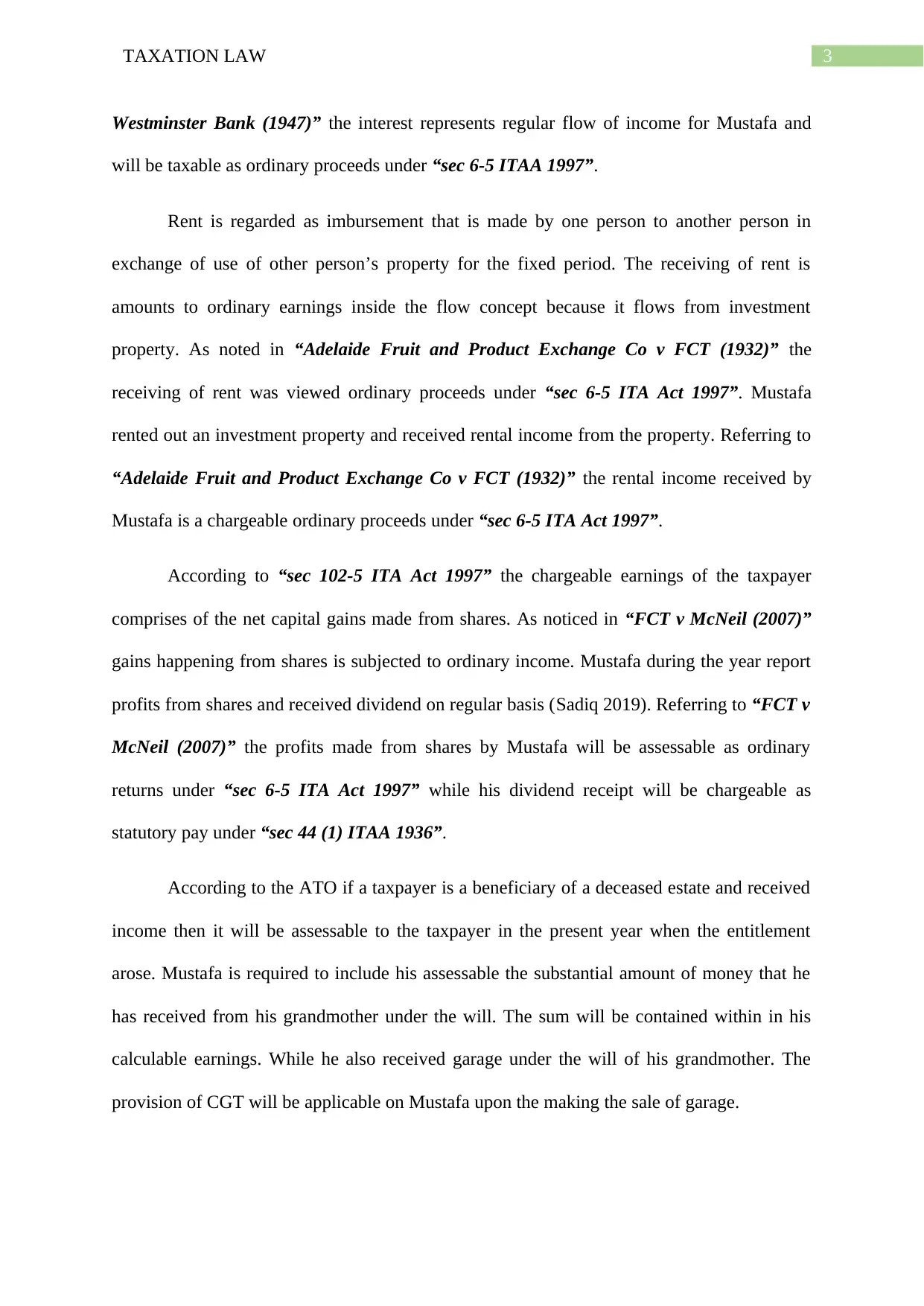
3TAXATION LAW
Westminster Bank (1947)” the interest represents regular flow of income for Mustafa and
will be taxable as ordinary proceeds under “sec 6-5 ITAA 1997”.
Rent is regarded as imbursement that is made by one person to another person in
exchange of use of other person’s property for the fixed period. The receiving of rent is
amounts to ordinary earnings inside the flow concept because it flows from investment
property. As noted in “Adelaide Fruit and Product Exchange Co v FCT (1932)” the
receiving of rent was viewed ordinary proceeds under “sec 6-5 ITA Act 1997”. Mustafa
rented out an investment property and received rental income from the property. Referring to
“Adelaide Fruit and Product Exchange Co v FCT (1932)” the rental income received by
Mustafa is a chargeable ordinary proceeds under “sec 6-5 ITA Act 1997”.
According to “sec 102-5 ITA Act 1997” the chargeable earnings of the taxpayer
comprises of the net capital gains made from shares. As noticed in “FCT v McNeil (2007)”
gains happening from shares is subjected to ordinary income. Mustafa during the year report
profits from shares and received dividend on regular basis (Sadiq 2019). Referring to “FCT v
McNeil (2007)” the profits made from shares by Mustafa will be assessable as ordinary
returns under “sec 6-5 ITA Act 1997” while his dividend receipt will be chargeable as
statutory pay under “sec 44 (1) ITAA 1936”.
According to the ATO if a taxpayer is a beneficiary of a deceased estate and received
income then it will be assessable to the taxpayer in the present year when the entitlement
arose. Mustafa is required to include his assessable the substantial amount of money that he
has received from his grandmother under the will. The sum will be contained within in his
calculable earnings. While he also received garage under the will of his grandmother. The
provision of CGT will be applicable on Mustafa upon the making the sale of garage.
Westminster Bank (1947)” the interest represents regular flow of income for Mustafa and
will be taxable as ordinary proceeds under “sec 6-5 ITAA 1997”.
Rent is regarded as imbursement that is made by one person to another person in
exchange of use of other person’s property for the fixed period. The receiving of rent is
amounts to ordinary earnings inside the flow concept because it flows from investment
property. As noted in “Adelaide Fruit and Product Exchange Co v FCT (1932)” the
receiving of rent was viewed ordinary proceeds under “sec 6-5 ITA Act 1997”. Mustafa
rented out an investment property and received rental income from the property. Referring to
“Adelaide Fruit and Product Exchange Co v FCT (1932)” the rental income received by
Mustafa is a chargeable ordinary proceeds under “sec 6-5 ITA Act 1997”.
According to “sec 102-5 ITA Act 1997” the chargeable earnings of the taxpayer
comprises of the net capital gains made from shares. As noticed in “FCT v McNeil (2007)”
gains happening from shares is subjected to ordinary income. Mustafa during the year report
profits from shares and received dividend on regular basis (Sadiq 2019). Referring to “FCT v
McNeil (2007)” the profits made from shares by Mustafa will be assessable as ordinary
returns under “sec 6-5 ITA Act 1997” while his dividend receipt will be chargeable as
statutory pay under “sec 44 (1) ITAA 1936”.
According to the ATO if a taxpayer is a beneficiary of a deceased estate and received
income then it will be assessable to the taxpayer in the present year when the entitlement
arose. Mustafa is required to include his assessable the substantial amount of money that he
has received from his grandmother under the will. The sum will be contained within in his
calculable earnings. While he also received garage under the will of his grandmother. The
provision of CGT will be applicable on Mustafa upon the making the sale of garage.
Paraphrase This Document
Need a fresh take? Get an instant paraphrase of this document with our AI Paraphraser
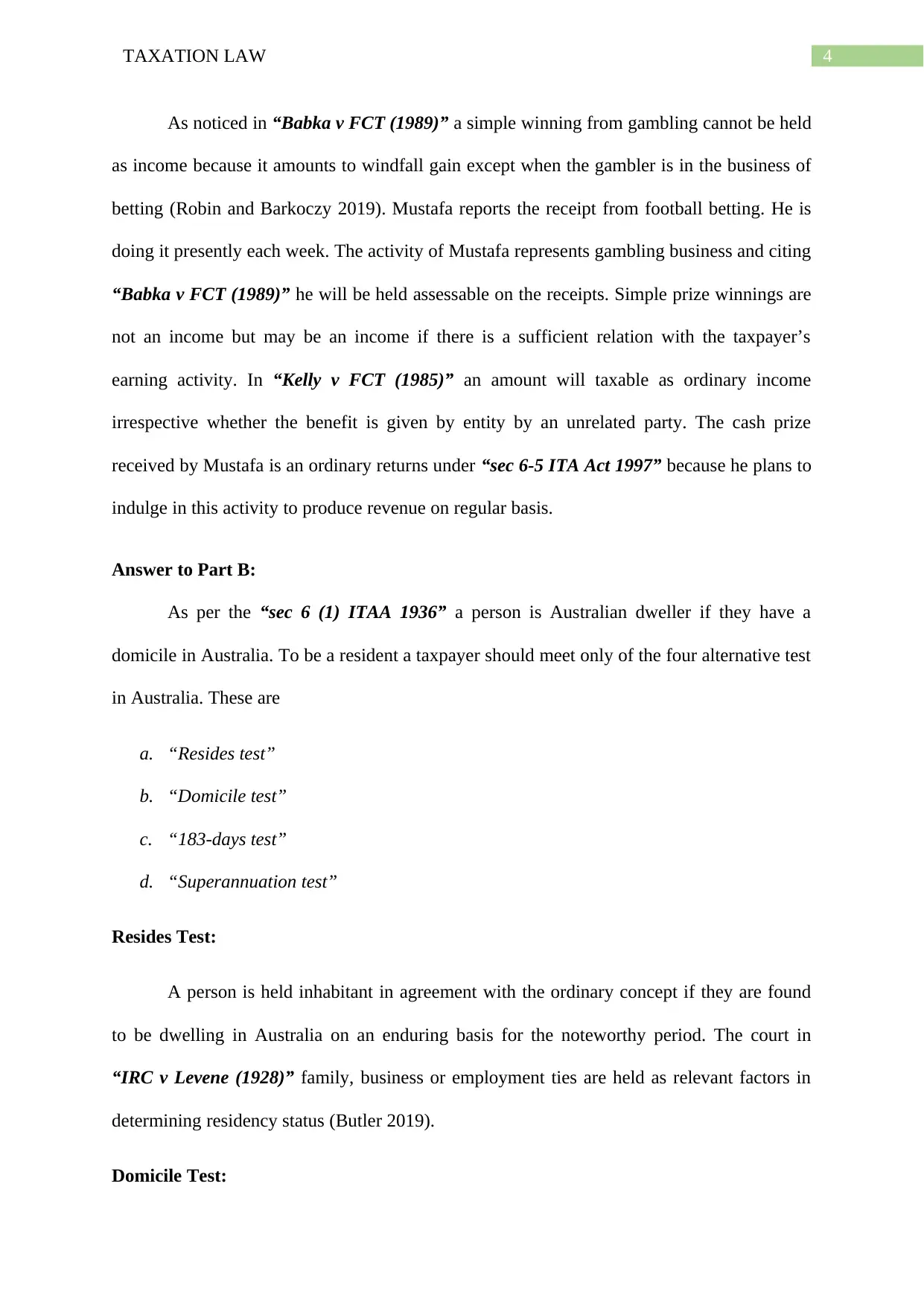
4TAXATION LAW
As noticed in “Babka v FCT (1989)” a simple winning from gambling cannot be held
as income because it amounts to windfall gain except when the gambler is in the business of
betting (Robin and Barkoczy 2019). Mustafa reports the receipt from football betting. He is
doing it presently each week. The activity of Mustafa represents gambling business and citing
“Babka v FCT (1989)” he will be held assessable on the receipts. Simple prize winnings are
not an income but may be an income if there is a sufficient relation with the taxpayer’s
earning activity. In “Kelly v FCT (1985)” an amount will taxable as ordinary income
irrespective whether the benefit is given by entity by an unrelated party. The cash prize
received by Mustafa is an ordinary returns under “sec 6-5 ITA Act 1997” because he plans to
indulge in this activity to produce revenue on regular basis.
Answer to Part B:
As per the “sec 6 (1) ITAA 1936” a person is Australian dweller if they have a
domicile in Australia. To be a resident a taxpayer should meet only of the four alternative test
in Australia. These are
a. “Resides test”
b. “Domicile test”
c. “183-days test”
d. “Superannuation test”
Resides Test:
A person is held inhabitant in agreement with the ordinary concept if they are found
to be dwelling in Australia on an enduring basis for the noteworthy period. The court in
“IRC v Levene (1928)” family, business or employment ties are held as relevant factors in
determining residency status (Butler 2019).
Domicile Test:
As noticed in “Babka v FCT (1989)” a simple winning from gambling cannot be held
as income because it amounts to windfall gain except when the gambler is in the business of
betting (Robin and Barkoczy 2019). Mustafa reports the receipt from football betting. He is
doing it presently each week. The activity of Mustafa represents gambling business and citing
“Babka v FCT (1989)” he will be held assessable on the receipts. Simple prize winnings are
not an income but may be an income if there is a sufficient relation with the taxpayer’s
earning activity. In “Kelly v FCT (1985)” an amount will taxable as ordinary income
irrespective whether the benefit is given by entity by an unrelated party. The cash prize
received by Mustafa is an ordinary returns under “sec 6-5 ITA Act 1997” because he plans to
indulge in this activity to produce revenue on regular basis.
Answer to Part B:
As per the “sec 6 (1) ITAA 1936” a person is Australian dweller if they have a
domicile in Australia. To be a resident a taxpayer should meet only of the four alternative test
in Australia. These are
a. “Resides test”
b. “Domicile test”
c. “183-days test”
d. “Superannuation test”
Resides Test:
A person is held inhabitant in agreement with the ordinary concept if they are found
to be dwelling in Australia on an enduring basis for the noteworthy period. The court in
“IRC v Levene (1928)” family, business or employment ties are held as relevant factors in
determining residency status (Butler 2019).
Domicile Test:
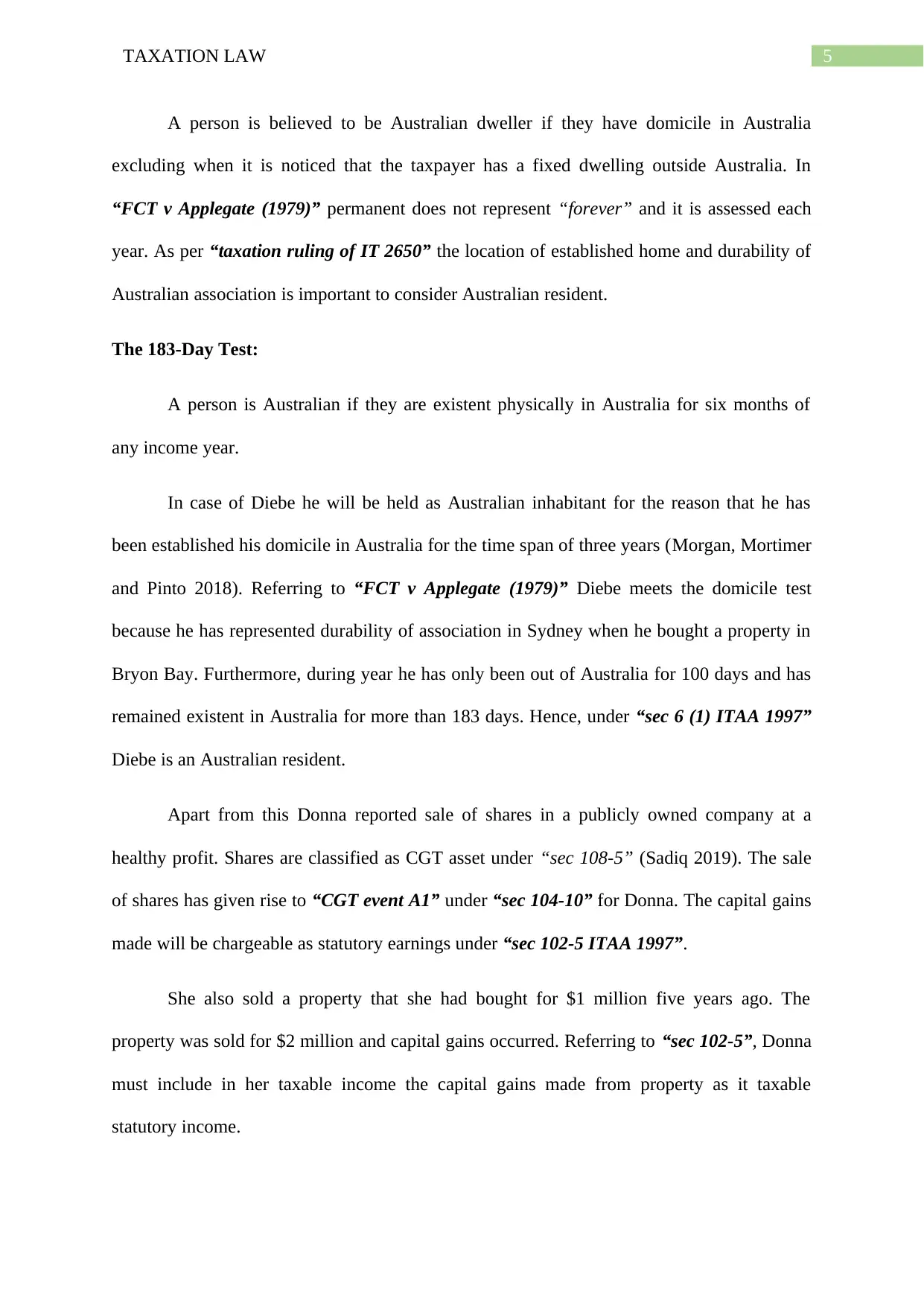
5TAXATION LAW
A person is believed to be Australian dweller if they have domicile in Australia
excluding when it is noticed that the taxpayer has a fixed dwelling outside Australia. In
“FCT v Applegate (1979)” permanent does not represent “forever” and it is assessed each
year. As per “taxation ruling of IT 2650” the location of established home and durability of
Australian association is important to consider Australian resident.
The 183-Day Test:
A person is Australian if they are existent physically in Australia for six months of
any income year.
In case of Diebe he will be held as Australian inhabitant for the reason that he has
been established his domicile in Australia for the time span of three years (Morgan, Mortimer
and Pinto 2018). Referring to “FCT v Applegate (1979)” Diebe meets the domicile test
because he has represented durability of association in Sydney when he bought a property in
Bryon Bay. Furthermore, during year he has only been out of Australia for 100 days and has
remained existent in Australia for more than 183 days. Hence, under “sec 6 (1) ITAA 1997”
Diebe is an Australian resident.
Apart from this Donna reported sale of shares in a publicly owned company at a
healthy profit. Shares are classified as CGT asset under “sec 108-5” (Sadiq 2019). The sale
of shares has given rise to “CGT event A1” under “sec 104-10” for Donna. The capital gains
made will be chargeable as statutory earnings under “sec 102-5 ITAA 1997”.
She also sold a property that she had bought for $1 million five years ago. The
property was sold for $2 million and capital gains occurred. Referring to “sec 102-5”, Donna
must include in her taxable income the capital gains made from property as it taxable
statutory income.
A person is believed to be Australian dweller if they have domicile in Australia
excluding when it is noticed that the taxpayer has a fixed dwelling outside Australia. In
“FCT v Applegate (1979)” permanent does not represent “forever” and it is assessed each
year. As per “taxation ruling of IT 2650” the location of established home and durability of
Australian association is important to consider Australian resident.
The 183-Day Test:
A person is Australian if they are existent physically in Australia for six months of
any income year.
In case of Diebe he will be held as Australian inhabitant for the reason that he has
been established his domicile in Australia for the time span of three years (Morgan, Mortimer
and Pinto 2018). Referring to “FCT v Applegate (1979)” Diebe meets the domicile test
because he has represented durability of association in Sydney when he bought a property in
Bryon Bay. Furthermore, during year he has only been out of Australia for 100 days and has
remained existent in Australia for more than 183 days. Hence, under “sec 6 (1) ITAA 1997”
Diebe is an Australian resident.
Apart from this Donna reported sale of shares in a publicly owned company at a
healthy profit. Shares are classified as CGT asset under “sec 108-5” (Sadiq 2019). The sale
of shares has given rise to “CGT event A1” under “sec 104-10” for Donna. The capital gains
made will be chargeable as statutory earnings under “sec 102-5 ITAA 1997”.
She also sold a property that she had bought for $1 million five years ago. The
property was sold for $2 million and capital gains occurred. Referring to “sec 102-5”, Donna
must include in her taxable income the capital gains made from property as it taxable
statutory income.
⊘ This is a preview!⊘
Do you want full access?
Subscribe today to unlock all pages.

Trusted by 1+ million students worldwide
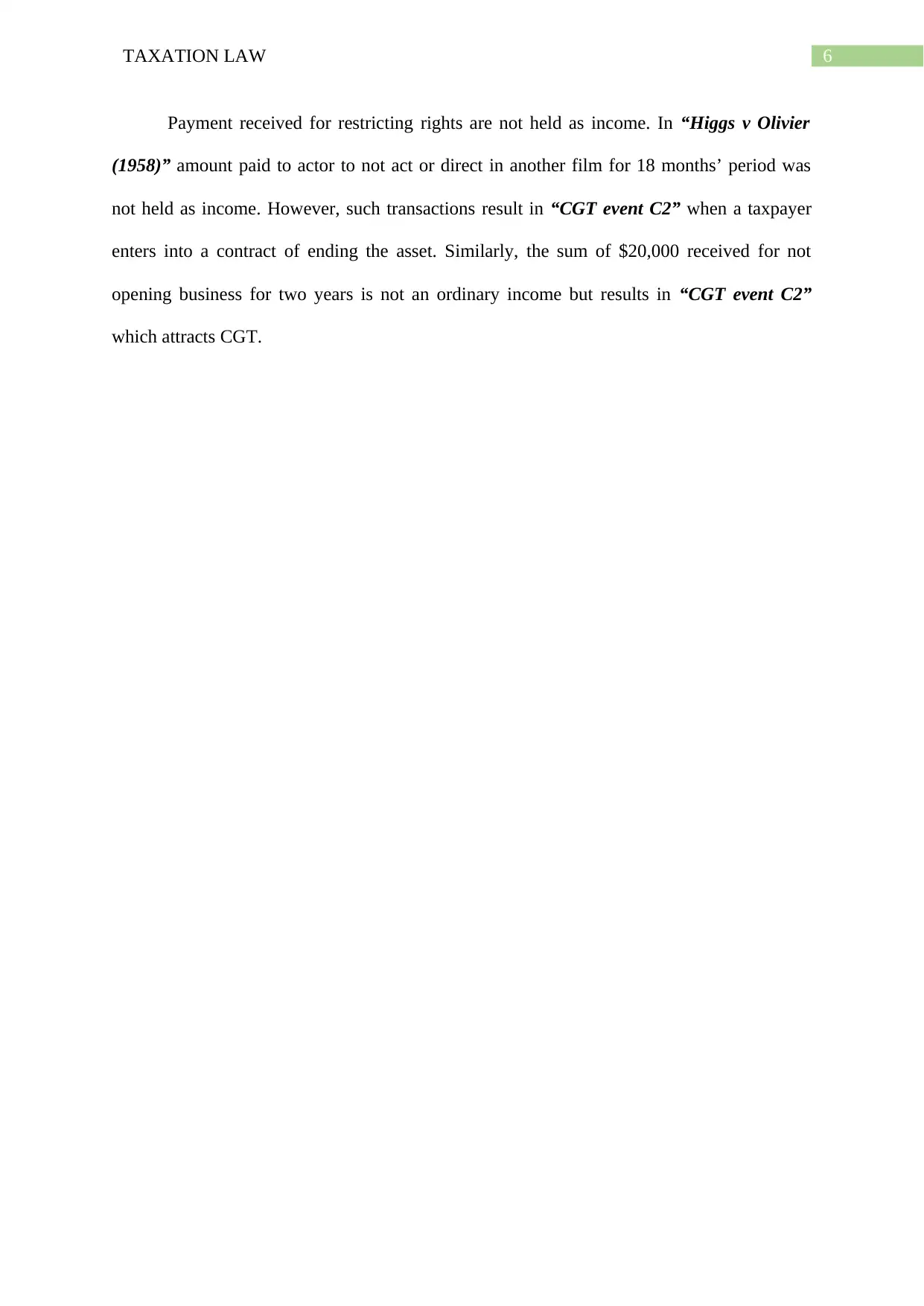
6TAXATION LAW
Payment received for restricting rights are not held as income. In “Higgs v Olivier
(1958)” amount paid to actor to not act or direct in another film for 18 months’ period was
not held as income. However, such transactions result in “CGT event C2” when a taxpayer
enters into a contract of ending the asset. Similarly, the sum of $20,000 received for not
opening business for two years is not an ordinary income but results in “CGT event C2”
which attracts CGT.
Payment received for restricting rights are not held as income. In “Higgs v Olivier
(1958)” amount paid to actor to not act or direct in another film for 18 months’ period was
not held as income. However, such transactions result in “CGT event C2” when a taxpayer
enters into a contract of ending the asset. Similarly, the sum of $20,000 received for not
opening business for two years is not an ordinary income but results in “CGT event C2”
which attracts CGT.
Paraphrase This Document
Need a fresh take? Get an instant paraphrase of this document with our AI Paraphraser
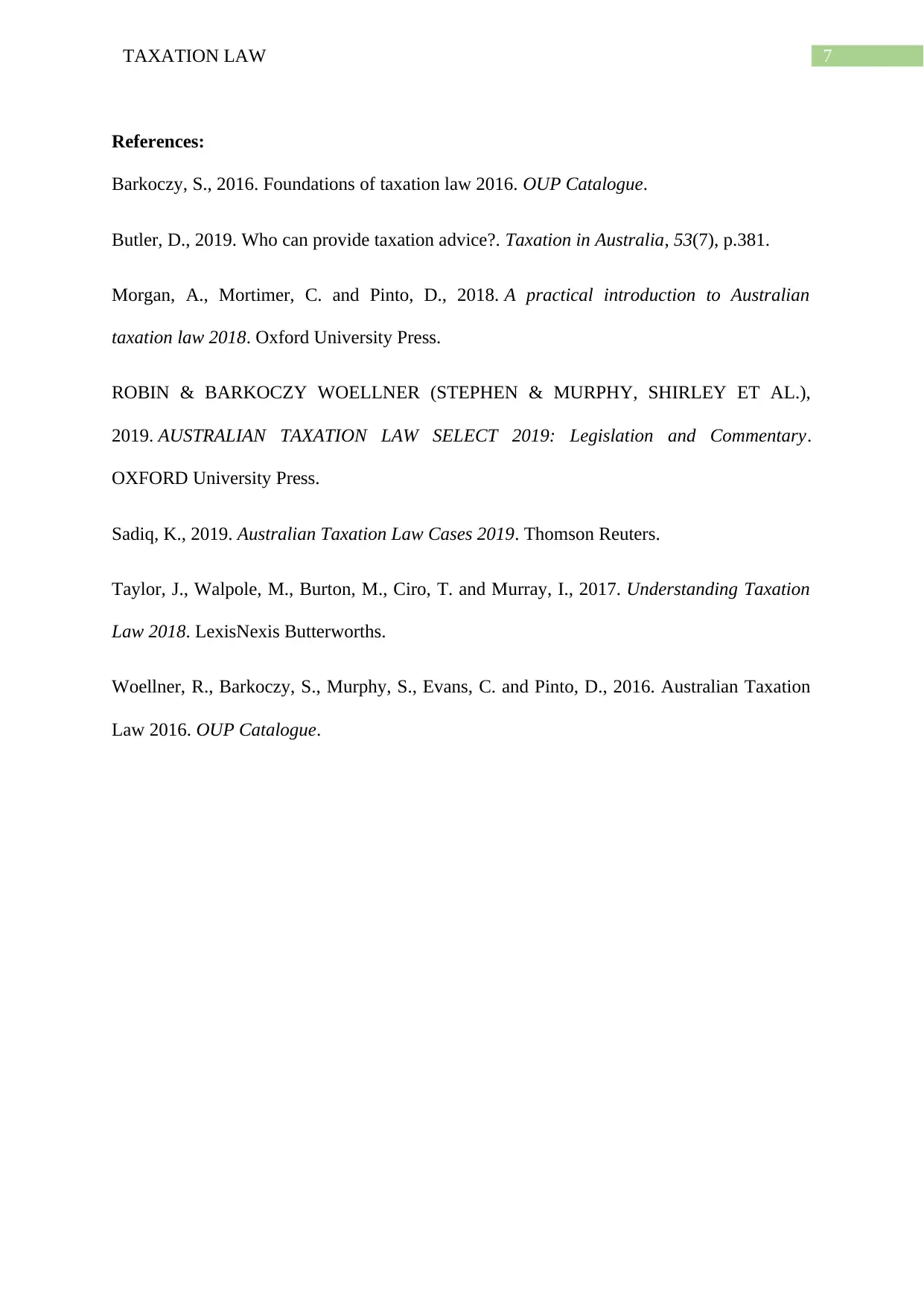
7TAXATION LAW
References:
Barkoczy, S., 2016. Foundations of taxation law 2016. OUP Catalogue.
Butler, D., 2019. Who can provide taxation advice?. Taxation in Australia, 53(7), p.381.
Morgan, A., Mortimer, C. and Pinto, D., 2018. A practical introduction to Australian
taxation law 2018. Oxford University Press.
ROBIN & BARKOCZY WOELLNER (STEPHEN & MURPHY, SHIRLEY ET AL.),
2019. AUSTRALIAN TAXATION LAW SELECT 2019: Legislation and Commentary.
OXFORD University Press.
Sadiq, K., 2019. Australian Taxation Law Cases 2019. Thomson Reuters.
Taylor, J., Walpole, M., Burton, M., Ciro, T. and Murray, I., 2017. Understanding Taxation
Law 2018. LexisNexis Butterworths.
Woellner, R., Barkoczy, S., Murphy, S., Evans, C. and Pinto, D., 2016. Australian Taxation
Law 2016. OUP Catalogue.
References:
Barkoczy, S., 2016. Foundations of taxation law 2016. OUP Catalogue.
Butler, D., 2019. Who can provide taxation advice?. Taxation in Australia, 53(7), p.381.
Morgan, A., Mortimer, C. and Pinto, D., 2018. A practical introduction to Australian
taxation law 2018. Oxford University Press.
ROBIN & BARKOCZY WOELLNER (STEPHEN & MURPHY, SHIRLEY ET AL.),
2019. AUSTRALIAN TAXATION LAW SELECT 2019: Legislation and Commentary.
OXFORD University Press.
Sadiq, K., 2019. Australian Taxation Law Cases 2019. Thomson Reuters.
Taylor, J., Walpole, M., Burton, M., Ciro, T. and Murray, I., 2017. Understanding Taxation
Law 2018. LexisNexis Butterworths.
Woellner, R., Barkoczy, S., Murphy, S., Evans, C. and Pinto, D., 2016. Australian Taxation
Law 2016. OUP Catalogue.
1 out of 8
Related Documents
Your All-in-One AI-Powered Toolkit for Academic Success.
+13062052269
info@desklib.com
Available 24*7 on WhatsApp / Email
![[object Object]](/_next/static/media/star-bottom.7253800d.svg)
Unlock your academic potential
Copyright © 2020–2026 A2Z Services. All Rights Reserved. Developed and managed by ZUCOL.





